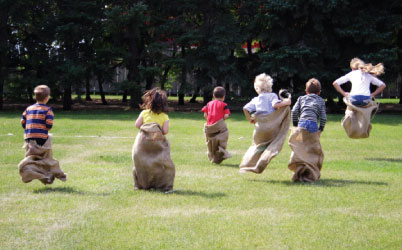|
|
I tried to teach my child with words.
They passed her over unheard.
I tried to teach my child with books.
He gave me only puzzled looks.
Despairingly I turned aside.
“How shall I teach this child,” I cried.
Into my hands she put the key.
“Come,” she said, “Play with me.”
-Author Unknown

We believe in the power of play. We believe that play affects change, which happens when we are able to be ourselves in the context of a relationship. Play is a place of imagination and magic; a place where we really can be ourselves. Combine that with positive relationships, and you will see behavioral change.
People can endure amazing difficulties when they have strong, supportive relationships to give them hope. The people with whom you have strong relationships are the ones that allow you to be yourself. They are the people you play with.
Kids use their imaginations to play at will; while adults tend to play for leisure. We can consciously decide to bring play into our work, our homes and our communities. We can enjoy playing together, learning together.
The fact is that the more intelligent the animal, the more it plays. There is so much purpose to play. Play is where children practice being adults, caring about others and making decisions. Play is how children experiment with empathy. Play is where we practice having power and making decisions. We learn self-determination by playing. Play is a primary way that children communicate, experiment and learn. Play is where children show us their inner feelings and expressions that they cannot or will not talk about. Play is a way that children recover from emotional distress. It’s a way for all of us to relieve stress.
In parenting, play is a way to be close; it’s a way for us to reconnect after closeness has been severed. Play is a great way to engage children, a way to pull them out of emotional shut down or misbehavior. It brings parents and children back to feeling connected and confident.
Humans learn to be responsible by playing. We learn to drive by pretending and imagining. We learn safety and boundaries by playing, sometimes making mistakes- learning from them eventually. Children pretend to work, practicing the skills that they see as important for adult life.
Play is also where children practice what adults teach us about hate, exclusion and superiority. We have the opportunity to build communities of inclusion by structuring play in a way that allows all participants to be important, contributing members. We can foster feelings of cooperation and confidence by having intention behind the way we build community among groups of people. Why leave it up to chance? Nobody likes to be the last person chosen for the baseball team. We can create an environment for play where all efforts are encouraged, instead of just the most highly skilled.

Play stimulates brain growth and the development of intelligence. Play enhances our ability to learn, to remember and to apply knowledge. Play fosters closeness, instead of isolation; confidence instead of powerlessness.
Playing can bridge two people. We build emotional bonds by playing. We build connections with children by playing; we can help them recover from emotional stress instead of adding to their emotional distress by playing.
When children are discouraged or punished for attempting to recover emotionally in a playful way, they retreat into themselves and become more isolated. When children are too frustrated or are unable to use play to master their world, they become isolated and feel powerless. Children need confidence to play. We can help build their confidence by using our imaginations to invite them to play. We can give them opportunities to experience confidence during games.
Play can be difficult and uncomfortable as an adult; however, we must put aside our desire to maintain control as well as our desire to be competitive to build a healthy community among children. We complain about the short-term attention spans of kids, but how long can we stand to play the game they want to play? How long can we play house or restaurant before we are multi-tasking with chores or thinking of all the things we really need to do? Do you focus on how to properly throw a ball? Or could you stand to just play catch like our kids want us to?
In our society, play can be difficult. We place high value on work, making money and gaining material items and affluence. But in times of increased isolation causing senseless violence, we need to focus on building feelings of importance and value of the individual in the community context. We can reduce conflictive feelings and violence by working together effectively. We must teach cooperation by practicing it.
Count your successes as the moments that you connect with others. Play a game if you have a couple of idle minutes or if you just need to rejuvenate. It will actually help you be more productive, and it will allow kids to have their needs met. Don’t get discouraged if your initial invitations with kids to play are rejected. They may be used to you dealing with them in a different way. Kids have to gain trust regarding your intentions; once they do, you will be able to play more freely with them. Your comfort levels will rise while theirs do. It’s a relationship. If you don’t know where to start, just keep it simple. Be silly. Mirror how young children are feeling, to let them know you can relate. Remember that every child has an instinct for play that buds just after birth and is fully developed by the age of 2-3 years. This, of course, includes you.
|
|
|
|

